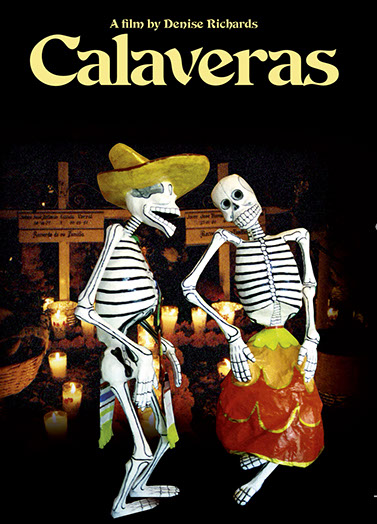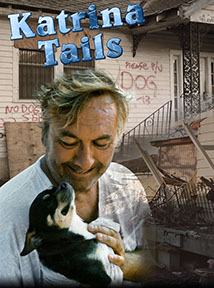About the Film
Calaveras is a 30 minute documentary on the altars that are built to remember and honor the deceased on the Day of the Dead. Popular in Latin America and parts of Asia, this tradition is based on the belief that the spirits of the dead return from the underworld each year for one day only. In recent years, the celebration has been adopted in many U.S. and European cities and the themes of the altars have evolved, so that they now are used to call attention to social concerns.
One of the altars depicted in the film was composed of 13,468 matches, one for each victim of AIDS in the Bay Area. It was set on fire on December 1st, the Day Without Art, to honor the memories of those who have passed on. The film also depicts two traditional altars for deceased fathers, one by a Chicano who has celebrated Dia de los Muertos all his life, and one by an African-American woman who is new to the tradition. The audience also meets Herminia Albarran Romero, a Mexican woman who has been building altars since she was a small child. She discusses her feelings on the importance of retaining the roots of the tradition to ensure that it does not become confused with Halloween.
Calaveras has been screened at many museums in conjunction with Day of the Dead ceremonies and has been incorporated into the curriculum of colleges and universities around the country. It is also being used as a tool by bereavement coordinators and K-12 teachers whose students have lost classmates to gang violence. Calaveras was chosen for screening at their annual meeting by the American Anthropological Association which awarded it a Commendation for Excellence. Calaveras also won the award for Best Documentary film at the Saguaro Film Festival and an Honorable Mention in the Documentary category at the Smoky Mountain Film Festival. The film was also featured at the Arizona International Film Festival and the Festival der Nations in Austria and has been broadcast on Independent Visions, Bay TV, and DUTV in Philadelphia.
Days of the Dead
Each year, on Nov. 1st and 2nd, Mexicans prepare to welcome back the spirits of their ancestors for one day only. They clean the tombs in the cemeteries, build altars (called ofrendas) comprised of food, things the dead liked in life, such as cards, beer, or clothes, and cook the deceased’s favorite dishes to place upon the altar, or bring to the cemetery. If the deceased was a child, the altar will contain toys as well and the celebration will be on October 31st, rather than November.
Day of the Dead is celebrated in all Hispanic countries to a greater or lesser degree, primarily depending on how many indigenous people remain in the area. For example, in Oaxaca and Michoacán in Mexico, the celebration is very important because many people of indigenous descent live in those states. When Mexico was a colony of Spain, the priests tried to convert the natives to Catholicism. Since the natives already had a tradition that revered their ancestors, they simply began to celebrate it at the beginning of November, which coincided with the Catholic All Saints/All Souls Days, thereby appearing to cooperate with the padres.
Today, the tradition is also celebrated in Guatemala and Bolivia, where many people are of indigenous descent, but Mexico is the country that has popularized the idea of the altars. There are both private and public versions, found in markets in all major cities. Some areas have contests for best private altar and winners then open up their homes for people to come and admire their ofrendas. The image above is one of the award-winning ofrendas in Oaxaca a few years ago.
An interesting aspect to the celebrations is that they vary greatly depending on the area of Mexico. For example, the Mayans in Chiapas have very different traditions that that of the Purepechas in Michoacán. Areas with a lesser population of indigenous descendants tend to have less-colorful, but still interesting events. Much more information on Mexico's Day of the Dead traditions can be found at MexConnect, a site that combines stories about Mexican culture culled from a variety of stories and from many different writers.
Reviews
Jorge Ruffinelli, Director, Center for Latin American Studies, Stanford University
A marvelous document of the human spirit asserting its' immortality. When dealing with grief, we have so few actual tools, ways in which to address or express our grief that result in some healing. The altar provides such a tool.
Kairos House, San Francisco
Great video, lively, accessible to middle school students. It presents a clear picture of what an altar is and how to make one. It inspired many of my students to make their own.
Carla Bazan, teacher, King Middle School, Berkeley
I feel it covered the fearful issue of death in a non-threatening way. I would use this altar with groups in a combined effort to make an altar as part of their therapeutic process.
Anne O'Brian, Bereavement Coordinator, Hospice by the Bay, San Francisco
Calaveras provides a positive outlet for grief and an avenue for closure in the grieving process. Calaveras should be of great interest to all those working in the field of bereavement counseling.
Nanette Gartrell, M.D., Associate Clinical Professor, UCSF
A moving and powerful film that brings a much needed message to a society that has largely lost our rituals around loss and grief.
Dale Borglum, The Living/Dying Project, Fairfax, CA
Contact

Dogs' Life Productions produces award-winning educational documentaries focusing on three main areas: art, animals, and anthropology. The company's films have been screened at festivals around the world and are used as curriculum adjuncts by many major universities in the US and Canada

Denise Richards is a graphic designer, documentary filmmaker, artist, and educator.
Distribution:
EDUCATIONAL Calaveras is available for educational licensing, along with other films from Dogs' Life Productions, through Kanopy Streaming.
BROADCAST: For interest in broadcasting or showing Calaveras either in the US or in territories outside of the US , please contact Denise Richards, using the form on the right.
Other Films from Dogs' Life Productions



